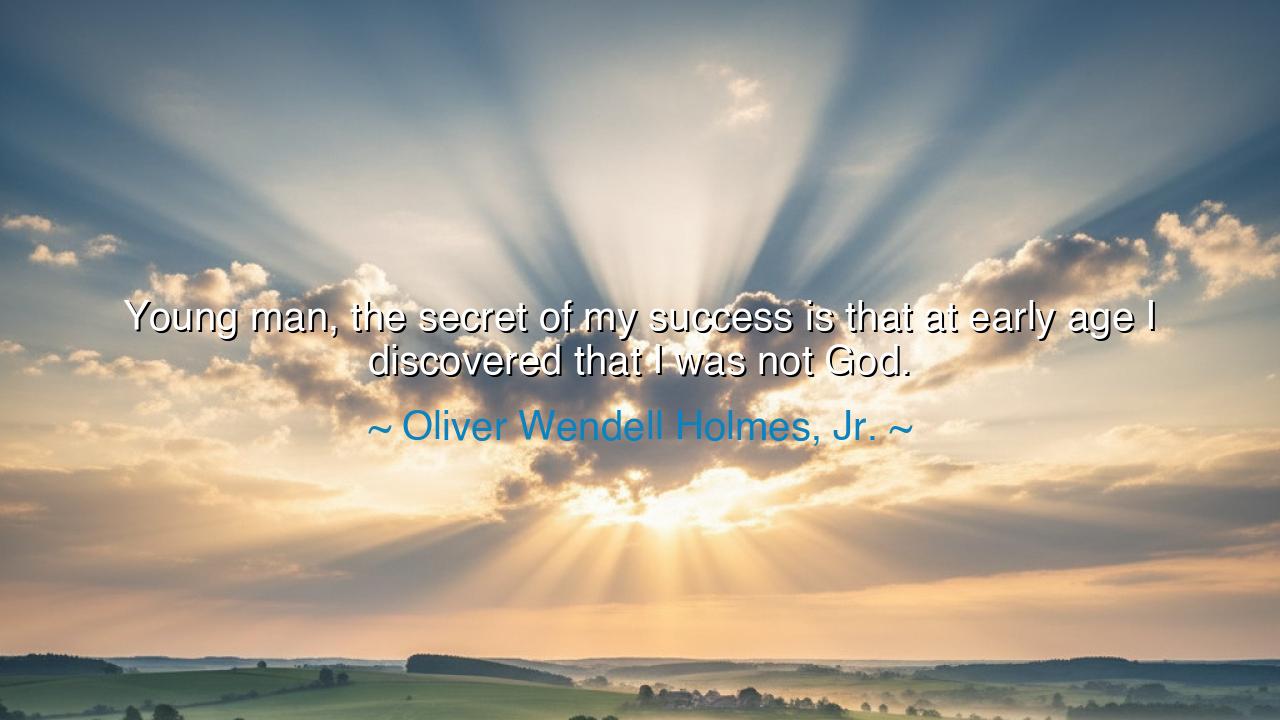
Young man, the secret of my success is that at early age I
Young man, the secret of my success is that at early age I discovered that I was not God.






The venerable Oliver Wendell Holmes, Jr., a titan of the American judiciary and a philosopher robed in humility, once uttered these timeless words: “Young man, the secret of my success is that at early age I discovered that I was not God.” At first glance, these words seem humble, even lighthearted. But beneath their simplicity lies a truth so profound that it forms the very bedrock of wisdom: the recognition of human limitation. Holmes, who had seen both the glory and the horror of life — from the smoke of the Civil War to the highest court of his nation — understood that true strength begins with the acceptance of our frailty, imperfection, and place in the order of things.
In the arrogance of youth, many believe themselves to be masters of destiny, shapers of fate, lords of their own universe. They confuse confidence with omnipotence, ambition with divinity. But those who walk far enough on the road of life come to see that hubris is the enemy of understanding, and that the measure of a man is not how high he exalts himself, but how deeply he bows before truth. Holmes’s “discovery” — that he was not God — was not an act of despair, but of liberation. It freed him from illusion, from the burden of trying to control what lies beyond mortal reach.
Consider the story of Napoleon Bonaparte, whose genius was both his gift and his curse. He strode across Europe like a demigod, reshaping nations, commanding armies, believing himself chosen by destiny itself. Yet the same fire that lifted him to power consumed him in the end. His refusal to acknowledge his limits led him to ruin — from the frozen wastes of Russia to exile on a lonely island. Had he known, as Holmes knew, that man is not God, he might have tempered his brilliance with wisdom. His downfall is the eternal lesson that pride blinds, while humility illuminates.
Holmes himself was no stranger to pride or passion. As a young soldier, he faced death on the battlefield and learned the fragility of life. Those moments of mortal peril carved humility into his soul. Later, as a judge, he weighed the actions of men not as one who ruled from on high, but as one who understood the weakness and struggle within every heart. His greatness lay not in believing himself infallible, but in knowing that he was fallible — and seeking truth despite it. He once said, “The life of the law has not been logic; it has been experience.” In this, too, we hear the echo of his humility — the wisdom that grows from scars, not theories.
To “discover that one is not God” is to accept that control is an illusion, that certainty is fleeting, and that wisdom blooms only in those who listen. It is to realize that success does not come from bending the world to one’s will, but from aligning oneself with the rhythms of reality. Those who believe themselves all-powerful soon find themselves broken by forces greater than pride can withstand. But those who bow to truth rise with quiet strength, unshaken by failure or fortune.
The lesson of Holmes’s saying is clear: humility is not weakness — it is mastery of the self. The proud man demands obedience from others; the wise man first conquers his own ego. To live well, one must learn when to act and when to yield, when to speak and when to listen. The sea teaches this lesson better than any book — for the sailor who fights the storm perishes, but the one who works with the wind reaches his destination. So too must the soul learn to move with life, not against it.
Therefore, young and old alike should remember: greatness does not come from pretending to be divine, but from embracing what is human — the capacity to learn, to err, to begin again. Stand tall in your purpose, yet bow before truth. Strive for excellence, yet remain teachable. When you succeed, do not claim omnipotence; when you fail, do not despair. For both triumph and loss are teachers sent by the same unseen hand.
Thus remember, O seeker of wisdom: the one who knows he is not God is already closer to the divine. For in humility, we find peace; in limitation, we find direction; and in self-knowledge, we find the key to all success. Walk, then, not as a god among men, but as a man who knows the measure of his soul — steadfast, humble, and free.






AAdministratorAdministrator
Welcome, honored guests. Please leave a comment, we will respond soon